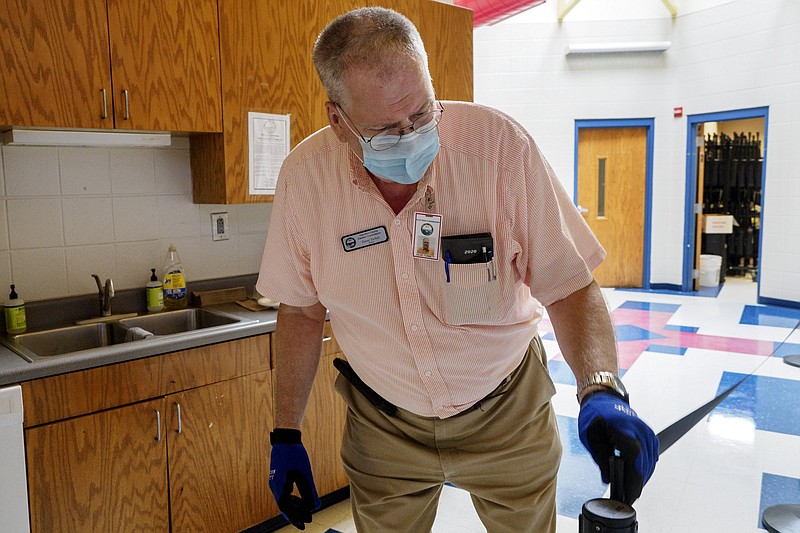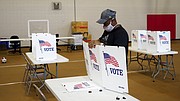Georgia early voting kicked off Monday with long lines in what is likely to become the largest vote in state history in a Nov. 3 general election headlined by a historic presidential race and two U.S. Senate contests, one of them a special election.
In Tennessee, early voting starts Wednesday. Recent elections suggest as many as 60% of voters statewide could cast their ballots during the two-week, Oct. 14-29 period before the traditional Election Day.
With heavy turnout expected due to the presidential contest between Republican President Donald Trump and Democratic nominee Joe Biden, officials in both Tennessee and Georgia have urged voters to take advantage of early voting in the midst of the coronavirus pandemic.
Georgia Public Broadcasting reported Monday morning that in Cobb County, the state's third largest, an early voting line tracker estimated two-hour waits across multiple sites.
Smaller Northwest Georgia counties' lines were shorter, the wait times less drastic. But it was still considered one of the busiest early voting days in recent memory.
Danielle Montgomery, elections director for Walker County, said she does not remember a busier day than Monday for early voting since starting her job in 2006. By 2:20 p.m., 351 people had voted early at the Walker County Courthouse. Asked if that was typical during a presidential election, she laughed and said, "Absolutely not."
"I can't recall of a day that we have had in 351 voters by 2:20 even the last day which is normally the busiest day," Montgomery said. "A few people were in their cars when I showed up at 7:30 this morning. The longest someone has had to wait was about 40 minutes, but right now we're looking at about 15 minutes."
In neighboring Catoosa County, Amy Vaughn at the Ringgold precinct said voters lined up starting at 7:30 a.m. and wait times have averaged about 15 minutes all day.
The Associated Press, meanwhile, reported heavy voting and technical glitches in some counties as Georgia voters headed to polls.
Although Republican-dominated Tennessee isn't considered in play in the presidential race, the nonpartisan Real Clear Politics' latest averaging of recent polls shows a tight contest in Georgia with Trump ahead of Biden by a slender 47.1% to 46.7%.
In Tennessee, there is the U.S. Senate contest where Republican nominee Bill Hagerty, Trump's former ambassador to Japan, faces Democrat Marquita Bradshaw, a Memphis environmental activist who unexpectedly won Democrats' August primary. She is Tennessee's first-ever Black Democratic nominee for statewide office.
Real Clear Politics rates the Tennessee U.S. Senate contest as "likely Republican" in a state which hasn't elected a Democratic senator since 1990 and where former Democratic Gov. Phil Bredesen managed only 44% in the 2018 race won by now-Republican U.S. Sen. Marsha Blackburn. The current contest is for the seat held by retiring Republican U.S. Sen. Lamar Alexander.
All nine of Tennessee's congressional seats are up, as are all 99 of the Tennessee state House seats and 16 of the 33 state Senate seats.
Among state-office contests is Senate District 10, which includes portions of Hamilton and Bradley counties. It features incumbent Sen. Todd Gardenhire, R-Chattanooga, and Democrat Glenn Scruggs, a Black Chattanooga assistant police chief.
The district, which includes the city of Chattanooga, is one of only a few General Assembly seats statewide that Democrats are focusing on as they seek to make modest inroads to GOP state Senate and House super majorities.
In Georgia, Republican U.S. Sen. David Perdue faces Democrat Jon Ossoff, who narrowly lost a 2017 special election in the state's 6th Congressional District. Also on the ballot is Libertarian Shane Hazel, and the Atlanta Journal-Constitution has reported Perdue has a slight edge.
Georgia also has the special U.S. Senate election to fill the seat formerly held by Republican Johnny Isakson, who in August 2019 announced he was stepping down for health reasons. Republican businesswoman Kelly Loeffler was appointed to fill the vacancy and there are 21 candidates on the ballot, including several Democrats, Republican U.S. Rep. Doug Collins and Libertarian Brian Slowinski.
Unlike Tennessee, Georgia candidates must win with more than 50% of the vote ,and a later runoff likely looms among the top two candidates emerging from the Nov. 3 election. The latest Real Clear Politics average shows Democrat Raphael Warnock with 29.7% to Loeffler's 23.5% and 21.7% for Collins.
While not officially on any ballot, the coronavirus is a presence and Tennessee Secretary of State Tre Hargett recently posted video on the agency's website seeking to reassure voters.
"Your safety is important to us," Hargett says in the video. "That's why election officials across our state are practicing increased safety measures to protect voters and poll officials. I'm asking you to do your part by wearing a face covering while taking advantage of the option to cast your vote during early voting."
Voters should expect to see signs with safety instructions at their polling locations, according to Hargett's office. Poll officials are being supplied with gowns, face shields, gloves and other personal protective equipment. All poll officials will be wearing face coverings and are trained in social distancing protocols.
Voters will "experience precautions taken such as single-use pens, disposable stylus to select their candidate and sanitizer at the polling location," the state says.
In Hamilton County, the election commission states on its website that it seeks to "encourage voters to bring a blue or black ink pen," while also noting officials "are providing each voter with single-use ink pens and ballot secrecy folders."
A Hamilton County election official told the Times Free Press that although the local commission expects an adequate supply of pens available, the language was included due to inquiries by some local voters asking if they can bring their own pens. Hargett's office says that's not a problem.
As a result of COVID-19 court rulings, a larger number of Tennesseans this election can also choose to vote absentee by mail if they list pandemic concerns. But at this point timelines for mailing their ballots to election officials in time to be counted are getting fairly tight. They first have to request the ballot by mail from the state. It then has to get it back to the would-be voter, who then has to mail it back and have it arrive at local election offices by Nov. 3.
The United States Postal Service's General Counsel Thomas J. Marshall at least twice has warned states, including Tennessee, that because of delays in the turn-around process at least some would-be-late absentee applicants could be lost in the lurch. In July, Marshall pointed out to Hargett that Tennessee law allows registered voters to mail their requests for absentee ballots to their county election commission up to seven days before Election Day, or by Oct. 27.
That late request application date appears to be "incompatible" with both the Postal Service's delivery standards and its recommended time frame to ensure on-time delivery, Marshall wrote.
Contact Andy Sher at asher@timesfreepress.com or 615-255-0550. Follow him on Twitter @AndySher1.
Contact Patrick Filbin at pfilbin@timesfreepress.com or 423-757-6476.

